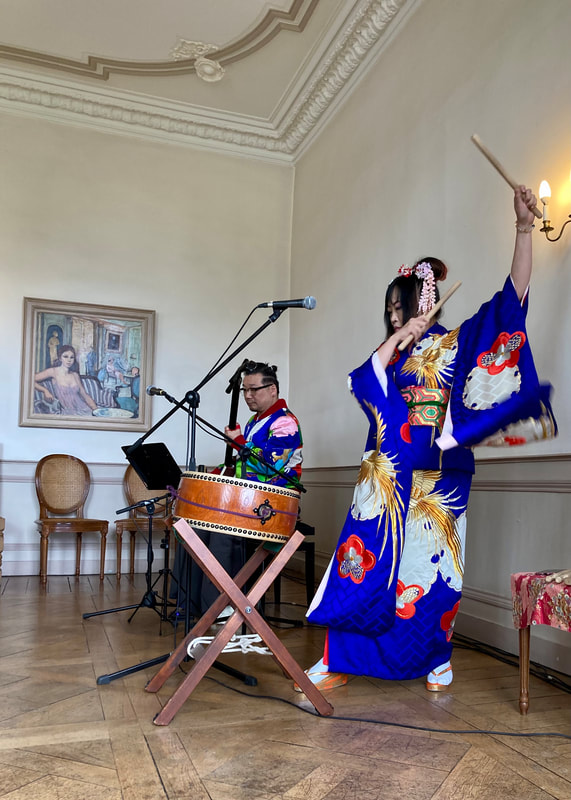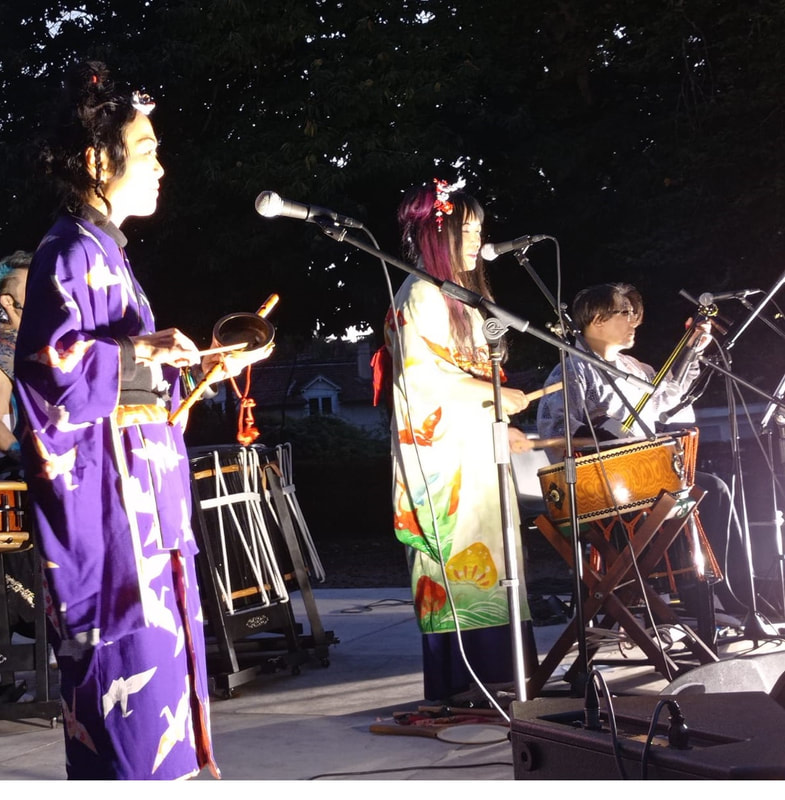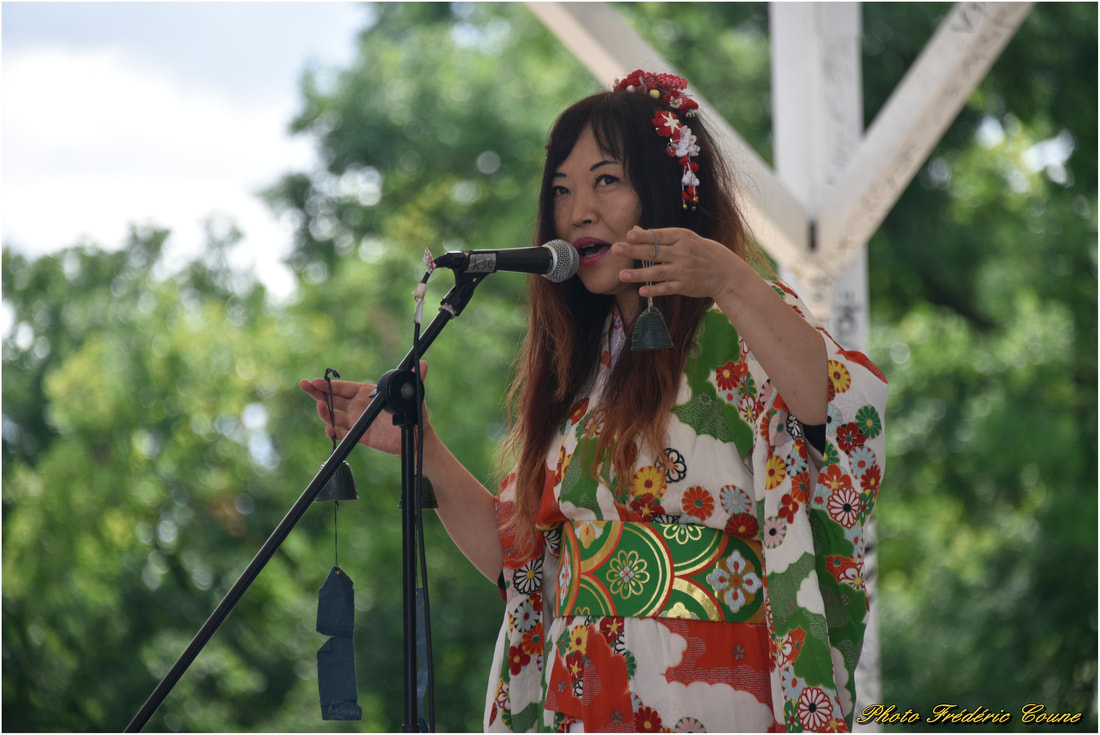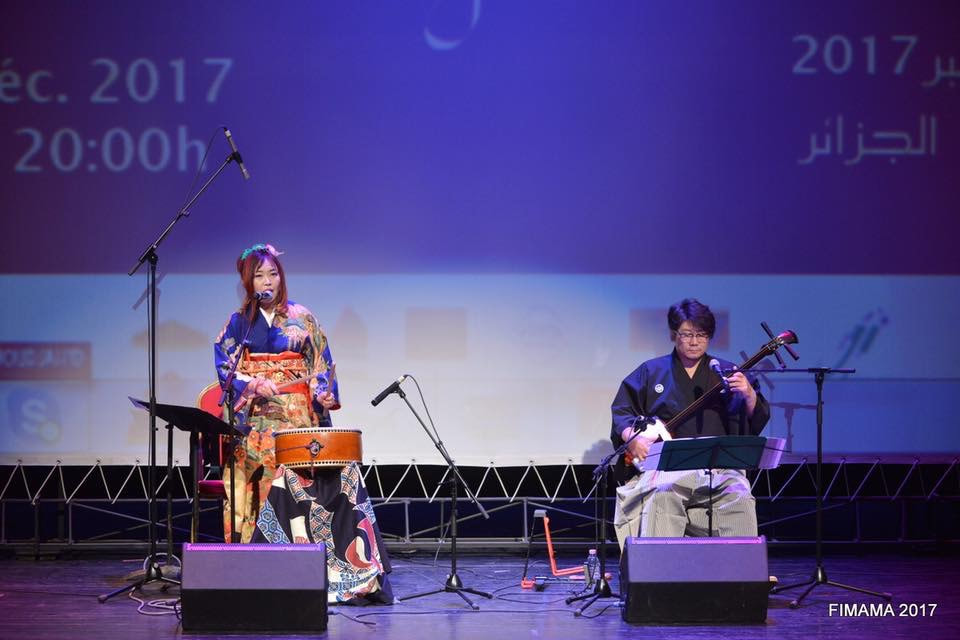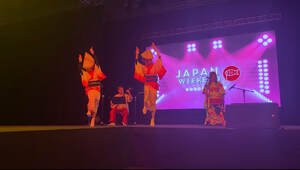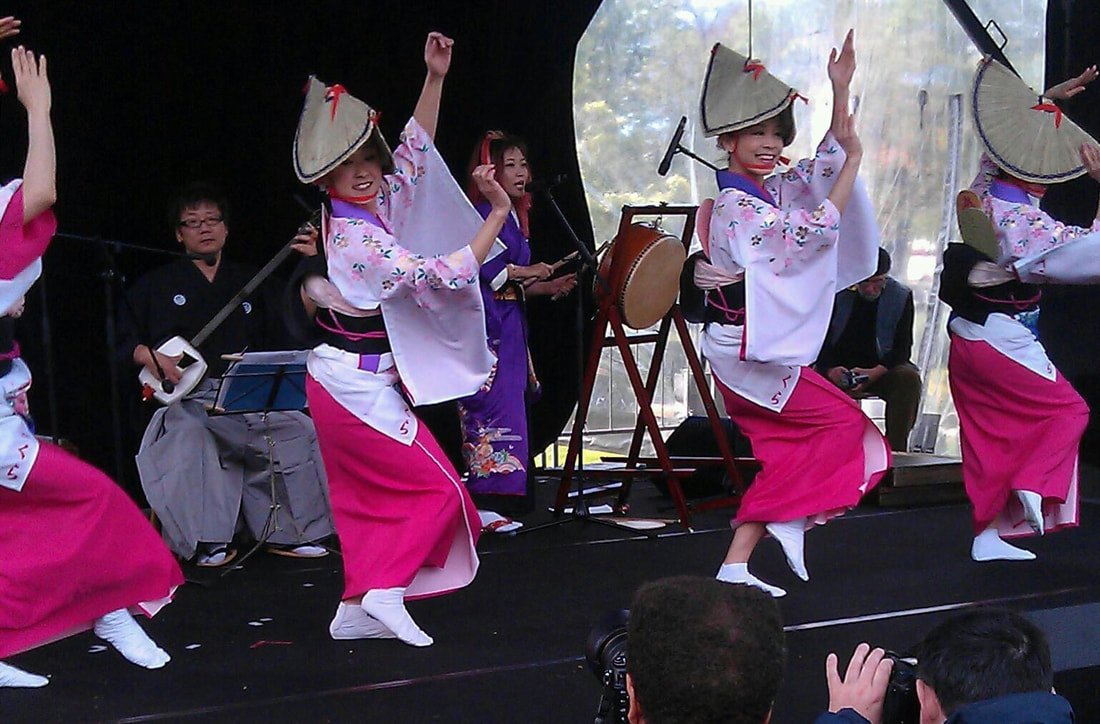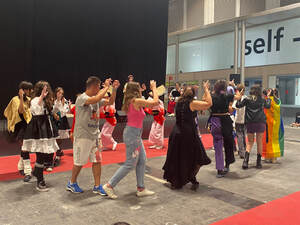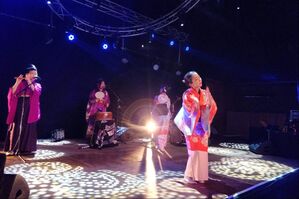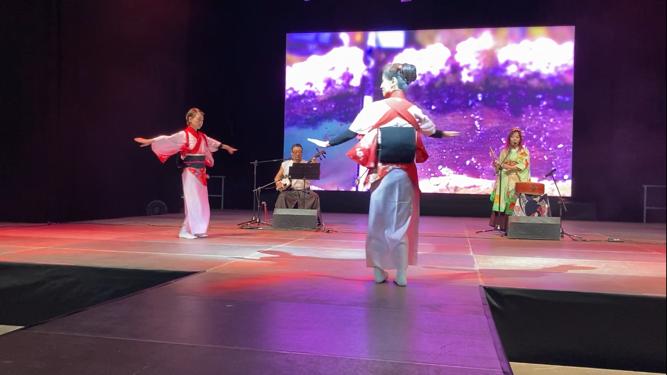Zeppin
traditional Japanese folk music
ZEPPIN is founded by Emiko OTA. The story goes back to 1999, when Emiko met a player from Koto and created the Sakura Ensemble in 2004. Their album appeared on the label Frémeaux & associés, and the band toured several national stages, performed at the Lyon National Opera, the National Museum of Asian Arts, the Albert Kahn Garden, the Jardin d'acclimatation, and was invited by the Japanese Embassy in Luxembourg and at several festivals in Spain, Norway and France (several times at the Bourges festival) until 2016. Following several changes and evolutions, the group became ZEPPIN in 2022.
Emiko continues to sing this repertoire of traditional Japanese folk music, the MINYO.
ZEPPIN is made up of several musicians who have made unique journeys in the traditional and contemporary musical world, and who have found themselves in the common project of carrying in France the repertoire of traditional and popular Japanese music. A rich and varied repertoire, yet still largely unknown to the Western public. ZEPPIN draws on the repertoire of traditional Japanese, popular/folk music. Invited by the Japanese Embassy in Algiers and performed at the International Festival of Andalusian Music and Ancient Music in Opera de Algiers, Invited by the Japanese embassy in Tunis and played opening of Carthage film festival at Opéra de Tunis, Maulevrier park, Upper Brittany botanical park, several festivals in France, the 3 largest Japanese event in Spain (Madrid, Barcelona, Alicante) and also ZEPPIN plays in the popular Japanese festival every region in France.
Some of these pieces have started to come to us: Sakura sakura is the most immediate example.
For the public, it is also an opportunity to discover the traditional Japanese instruments (flutes, shamisen, taiko) as well as the vocal techniques specific to the musical history of Japan.
traditional Japanese folk music
ZEPPIN is founded by Emiko OTA. The story goes back to 1999, when Emiko met a player from Koto and created the Sakura Ensemble in 2004. Their album appeared on the label Frémeaux & associés, and the band toured several national stages, performed at the Lyon National Opera, the National Museum of Asian Arts, the Albert Kahn Garden, the Jardin d'acclimatation, and was invited by the Japanese Embassy in Luxembourg and at several festivals in Spain, Norway and France (several times at the Bourges festival) until 2016. Following several changes and evolutions, the group became ZEPPIN in 2022.
Emiko continues to sing this repertoire of traditional Japanese folk music, the MINYO.
ZEPPIN is made up of several musicians who have made unique journeys in the traditional and contemporary musical world, and who have found themselves in the common project of carrying in France the repertoire of traditional and popular Japanese music. A rich and varied repertoire, yet still largely unknown to the Western public. ZEPPIN draws on the repertoire of traditional Japanese, popular/folk music. Invited by the Japanese Embassy in Algiers and performed at the International Festival of Andalusian Music and Ancient Music in Opera de Algiers, Invited by the Japanese embassy in Tunis and played opening of Carthage film festival at Opéra de Tunis, Maulevrier park, Upper Brittany botanical park, several festivals in France, the 3 largest Japanese event in Spain (Madrid, Barcelona, Alicante) and also ZEPPIN plays in the popular Japanese festival every region in France.
Some of these pieces have started to come to us: Sakura sakura is the most immediate example.
For the public, it is also an opportunity to discover the traditional Japanese instruments (flutes, shamisen, taiko) as well as the vocal techniques specific to the musical history of Japan.
Zeppin
musique traditionnelle populaire japonais
ZEPPIN est fondé par Emiko OTA. L’histoire remonte à 1999, lorsqu’Emiko rencontre une joueuse de Koto et crée l’Ensemble Sakura en 2004.
Leur album paraît sur le label Frémeaux & associés, et le groupe tourne sur plusieurs scènes nationales, joue à l’opéra national de Lyon, au Musée National des Arts Asiatiques, au Jardin Albert Kahn, au Jardin d’acclimatation, et est invité par l’ambassade du Japon au Luxembourg et à plusieurs festival en Espagne, en Norvège et en France (plusieurs fois au festival de Bourges) jusqu’à 2016. Suite à plusieurs remaniements et évolutions, le groupe est devenu ZEPPIN en 2022.
Emiko continue de chanter ce répertoire de la musique traditionnelle populaire japonaise, le MINYO.
ZEPPIN est constitué de plusieurs musiciens accomplis lors de parcours singuliers dans le monde musical traditionnel et contemporain, et qui se sont retrouvés dans le projet commun de porter en France le répertoire de la musique traditionnelle et populaire japonaise. Un répertoire riche et varié, mais pourtant encore largement méconnu du public occidental. ZEPPIN puise dans le répertoire de la musique traditionnelle japonaise, populaire/folklorique. Invité par l’Ambassade Japon au Alger et joué au Festival International de Musique Andalousie et des Musique Anciennes à Opera de Alger, Invité par
l’ambassade Japon au Tunis et joué ouverture de Carthage film festival à Opéra de Tunis, parc Maulevrier, parc botanique haut de Bretagne, plusieurs festival en France, le 3 plus grands evenement Japonais en Espagne (Madrid, Barcelone, Alicante) et aussi ZEPPIN joue dans les populaires festival Japonais chaque régions en France.
Certains de ces morceaux ont commencé à cheminer jusqu’à nous : Sakura sakura est l’exemplele plus immédiat.
Pour le public, c'est aussi l'occasion de découvrir les instruments traditionnels japonais (flûtes japonaises, shamisen, taiko) ainsi que les techniques vocales propres à l’histoire musicale du Japon.
Ensemble Zeppin joue aussi un style de musique japonaise peu connu en Occident : le Minyô. Il s'agit d'une musique populaire, souvent accompagnant les fêtes. Elle est enjouée et dansante et raconte des scènes de la vie quotidienne de chaque région du Japon.
Zeppin est un groupe à géométrie variable tourné vers l'interprétation de la musique populairejaponaise ancienne, le « minyô »
Le répertoire de Zeppin couvre plusieurs styles de minyô différents et leurs concerts alternent donc quelques passages nostalgiques et mélodiques parmi les morceaux généralement rythmés et enjoués des minyô interprétés pour les fêtes.
Japan weekend au Madrid & Barcelone
Zeppin also plays a style of Japanese music little known in the West: the Minyo. It is a popular music, often accompanying the fetes. It is playful and danceable and tells scenes of everyday life in every region of Japan. The popular dances of Japan are similar to western folk dances in that they aim to make the greatest number of village populations dance. It is therefore quite possible to learn the basic steps and movements in a fairly short time and to start to approach a small choreography, which can possibly be presented to an audience..
Zeppin joue aussi un style de musique japonaise peu connu en Occident : le Minyo. Il s'agit d'une musique populaire, souvent accompagnant les fètes. Elle est enjouée et dansante et raconte des scènes de la vie quotidienne de chaque région du Japon. Les danses populaires du Japon s'apparentent à nos danses folkloriques françaises en ce sens qu'elles visent à faire danser le plus grand nombre des populations villageoises. Il est donc tout à fait possible d'apprendre les pas et mouvements de base dans un temps assez réduit et de commencer à aborder une petite chorégraphie, qui pourra éventuellement être présentée devant un public.
|
|
|
|
Emiko Ota - Chant & Taiko
Mayu Sato - Flute (Shinobue, Nohkan)
Hideaki Tsuji - Shamisen (Tsugaru)
Julien Omeyer - Shamisen
Mariko Wada - Danseuse (Minyo, Contemporain)
Mary Katakura - Danseuse (Minyo, Contemporain)
Kaori Inoue - Danseuse (Minyo, Contemporain)
Yoko Sobue - Danseuse (Minyo, Traditionnelle & Contemporain)
Mayu Sato - Flute (Shinobue, Nohkan)
Hideaki Tsuji - Shamisen (Tsugaru)
Julien Omeyer - Shamisen
Mariko Wada - Danseuse (Minyo, Contemporain)
Mary Katakura - Danseuse (Minyo, Contemporain)
Kaori Inoue - Danseuse (Minyo, Contemporain)
Yoko Sobue - Danseuse (Minyo, Traditionnelle & Contemporain)
